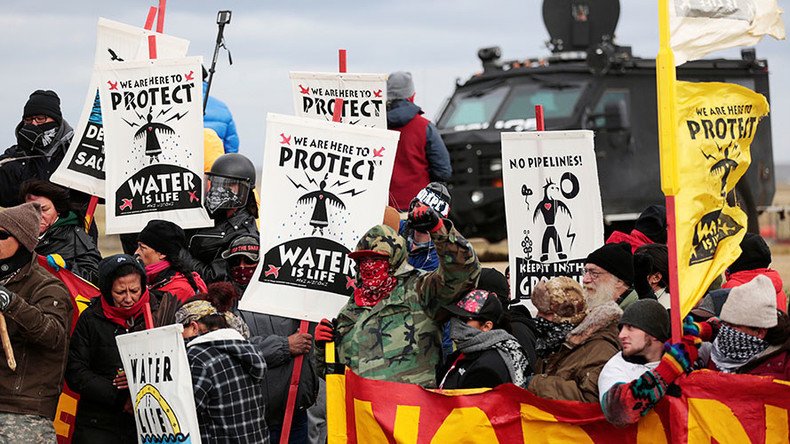Tribe protesting Dakota pipeline approves its land to relocate illegal camp – report

The Standing Rock Sioux tribe has agreed to provide its land to relocate an unauthorized anti-Dakota Access pipeline protest camp off US Army Corps of Engineers property for the winter. However, a tribal leader says many want to stay on the federal land.
The Standing Rock Sioux’s tribal council voted 8-5 on Tuesday to allow its reservation land to be used as a new site for Native Americans and their supporters to protests against the Dakota Access Pipeline (DAP).
The approved land is just two miles south of the large Oceti Sakowin, or Seven Council Fires camp on US Army Corps of Engineers property, that has been occupied without permission since August, when protests started gaining momentum.
With an average of 500 to 700 people, the camp has also seen waves of supporters coming, bringing its population to thousands and earning it the label as the largest gathering of Native American tribes in a century.
#NoDAPL protest camp against Dakota Access Pipeline on federal land to be left alone for now https://t.co/jZV9xrxe1Qpic.twitter.com/07U1iVNFOo
— RT America (@RT_America) 3 октября 2016 г.
With a notoriously cold North Dakota winter just months away, the idea was to build permanent structures on tribal land, so that the protest against the 1,172-mile pipeline could continue.
“The cold is coming and the snow is coming,” tribal chairman Dave Archambault II said Wednesday, according to the Associated Press. “It makes sense to be proactive and not reactive.”
However, not everyone is ready to vacate the federal land. A protest organizer from another tribe, the Cheyenne River Sioux in South Dakota, has said that the offer came a little too late.
#DakotaAccessPipeline company and Standing Rock Sioux Tribe's interests clash in court https://t.co/LVRnFSDJnjpic.twitter.com/g3rfeFUeKO
— RT America (@RT_America) 6 октября 2016 г.
“Some people might move but I don’t think the majority of them will,” said Cody Hall, a protest organizer, AP reported. “The (Standing Rock) tribe sat on its heels too long and people started losing faith.”
Earlier in October, Hall indicated an intention to stay at the camp regardless of weather conditions, saying, "We're not leaving until we defeat this big black snake."
“It is a good move and gesture … by the council to make that decision to try to get those individuals back onto tribal land,” Morton County Sheriff Kyle Kirchmeier said.
The US Army Corps of Engineers has also said that it supports the move, indicating that people’s lives were a priority.
“We have been in communication with the chairman and he has expressed his concern for life, health and safety,” Eileen Williamson said on behalf of the agency. “If people chose not to move, they are there at their own risk.”
The corps have been encouraging protesters to relocate their camp to permitted areas, but never proceeded with forceful eviction, saying its hands were “tied” by freedom of speech.
"We don't have the physical ability to go out and evict people – it gives the appearance of not protecting free speech," Williamson said earlier.
The four-states pipeline was first opposed by the Standing Rock Sioux for its planned route underneath the Missouri River, which the tribe said would potentially damage its drinking water and irrigation.
The tribe has also been insisting that the construction, led by the Dallas-based Energy Transfer Partners, would vandalize several areas of "significant cultural and historic value." In late September, Energy Transfer Partners bought a 7,000-acre ranch land that tribal officials claimed is the site of Sioux artifacts destroyed by pipeline crews, further complicating tensions among protesters, building crews and security officers, locals, and law enforcement.
In late August, the tribe requested a temporary injunction to halt construction, but a federal judge denied the request weeks later.












